Music is an integral part of human culture and most people can’t imagine life without it. Behind every chart-topping song or album is an unsung hero – the music producer. Though not directly in the spotlight, music producers play a pivotal role in shaping the music we listen to.
The music producer oversees every aspect of a recording project, from choosing and arranging songs to directing performances and deciding on the final sound. They work closely with artists, engineers, and other collaborators to bring a musical vision to life. Music producers need equal parts creativity, technical know-how, and business savvy to excel in their profession.
To become a music producer is a lofty goal that requires dedication and an unwavering passion for music. The world of music production is highly competitive but also ripe with opportunities for those willing to hustle. The internet has opened new doors for enterprising producers to build home studios and collaborate with artists remotely. However, becoming an established producer still takes a great deal of time, effort, and persistence.
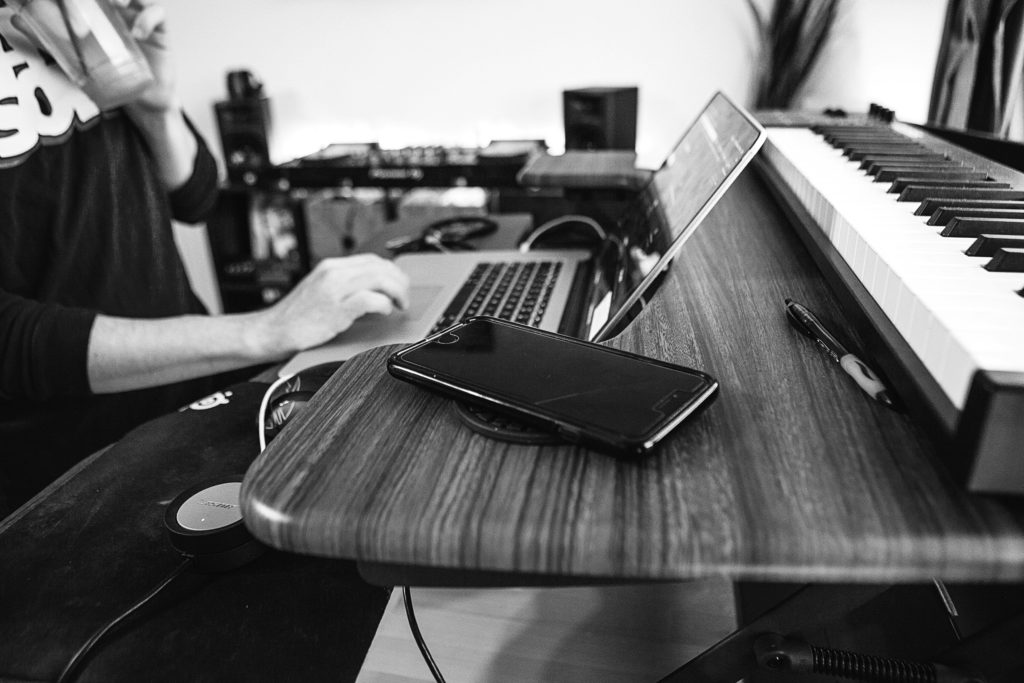
How to Become a Music Producer: Table of Contents
In this comprehensive guide, we will demystify the path to becoming a professional music producer. Whether you’re just starting out or looking to level up in your career, you’ll discover what it takes to make it as a producer. From the essential skills and equipment needed to earning strategies and overcoming challenges, we cover all bases so you can turn your producing dreams into a rewarding reality.
What is a Music Producer?
Before diving into how to become a music producer, it helps to fully understand what a music producer does. In short, a music producer is the guide who steers the creative vision of a recording project and brings it to fruition.
Job Description
A music producer’s day-to-day responsibilities can vary tremendously depending on the project and stage of production. However, some typical tasks and duties include:
- Pre-production – Selecting songs, hiring musicians, booking studios, creating budgets, schedules etc.
- Studio sessions – Directing rehearsals and takes, providing feedback to artists and engineers, making creative decisions.
- Post-production – Overseeing mixing process, advising on tonal balance, effects, song order etc.
- Mastering – Giving notes and approval for final mastered version.
- Promotion – Planning marketing assets like music videos and singles. Approving merch designs, cover art etc.
- Managing relationships – Communicating regularly with collaborators like artists, engineers, marketing teams throughout the process.
- Troubleshooting issues – Stepping in creatively or technically when problems arise during recording and production.
- Administrative work – Handling contracts, budgets, invoices, royalties etc.
Being a music producer requires collaboration with a diverse team including:
- Artists – Producers directly shape the artist’s performance and offer guidance. Trust is crucial.
- Recording engineers – Producers relay the overall vision while engineers handle technical execution.
- Instrumentalists – Producers communicate arrangements and provide direction during recording sessions.
- Record labels – Producers work with labels on budgets, release plans, promotions etc.
Juggling all these responsibilities requires organizational skills and grace under pressure. However, seeing a project transform from idea to finished album makes it all worthwhile.
Types of Producers in Music Industry
While all producers oversee recording projects, there are several distinct roles a producer can take on:
- Record Producer – The core producer who works directly in the studio overseeing the sessions. They handle creative direction and technical elements.
- Executive Producer – The executive producer manages the business side, including budgets, schedules, contracts etc.
- Vocal Producer – A vocal producer specifically coaches vocalists on technique, harmony arrangements and lyric rewrites.
- Mixing Engineer – While not a “producer” per se, mixing engineers shape the sound during post-production.
- Mastering Engineer – Mastering engineers put the final polish on a mixed song and prepare it for release.
- Co-Producer – Large projects may have multiple producers collaborating together in a co-production role.
The lines between these roles are blurry. A producer may take on multiple hats or hand off duties to specialists. For example:
- A hip-hop producer may create original beats in addition to helming studio sessions.
- A vocal producer may coach artists in the studio and also mix tracks.
- An executive producer may share creative oversight with a record producer.
- A solo indie artist may produce themselves.
The variation in types of producers allows greater versatility in assembling the perfect production team for each project. Producers should play to their own strengths and passions within this diverse landscape.
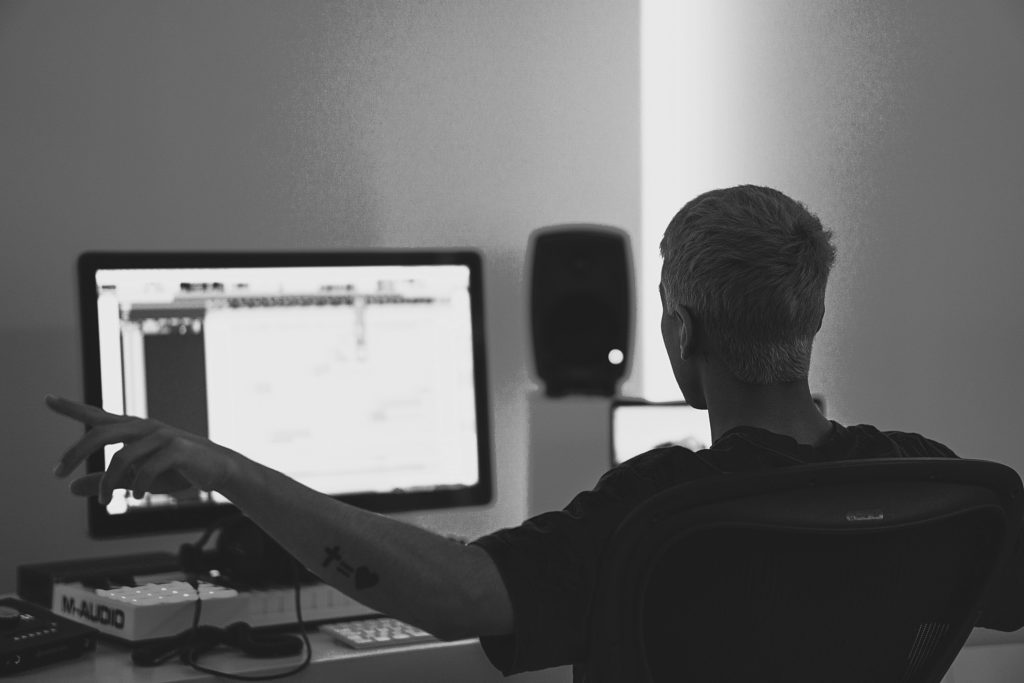
Why Become a Music Producer?
If you’re on the fence about pursuing music production, consider these compelling reasons to take the plunge:
Creative Fulfillment
Producing allows you to be hands-on in crafting the sound of new music. There’s an unmatched rush that comes from hearing your artistic vision come to life. If you’re a creative spirit passionate about music, producing offers a fulfilling path to channel that energy.
Variety and Collaboration
Every new project brings fresh faces and sounds to explore. Producers get to collaborate with diverse artists across all genres. No two days or sessions are ever the same. This variety keeps you engaged and constantly learning.
Shape Artists’ Careers
A great producer can have immense influence over an artist’s sound and direction. Being able to hear your influence on albums that fans love is deeply rewarding. Producers take pride in helping artists fully realize their potential.
Potential for High Earnings
While pay varies widely, successful producers at the top of the game earn multi-million dollar incomes. Producers earn royalties from song credits in addition to their fees. Your earnings scale up the more acclaimed projects you work on.
Flexibility and Freedom
Producers can often set their own schedule around sessions and gigs. Especially if producing out of a home studio, you control your own working hours. The growth of remote collaboration also creates more flexibility in your workflow.
If those reasons resonate with your passions, read on to start your journey to life as a music producer. The path requires dedication but the destination is immensely fulfilling.
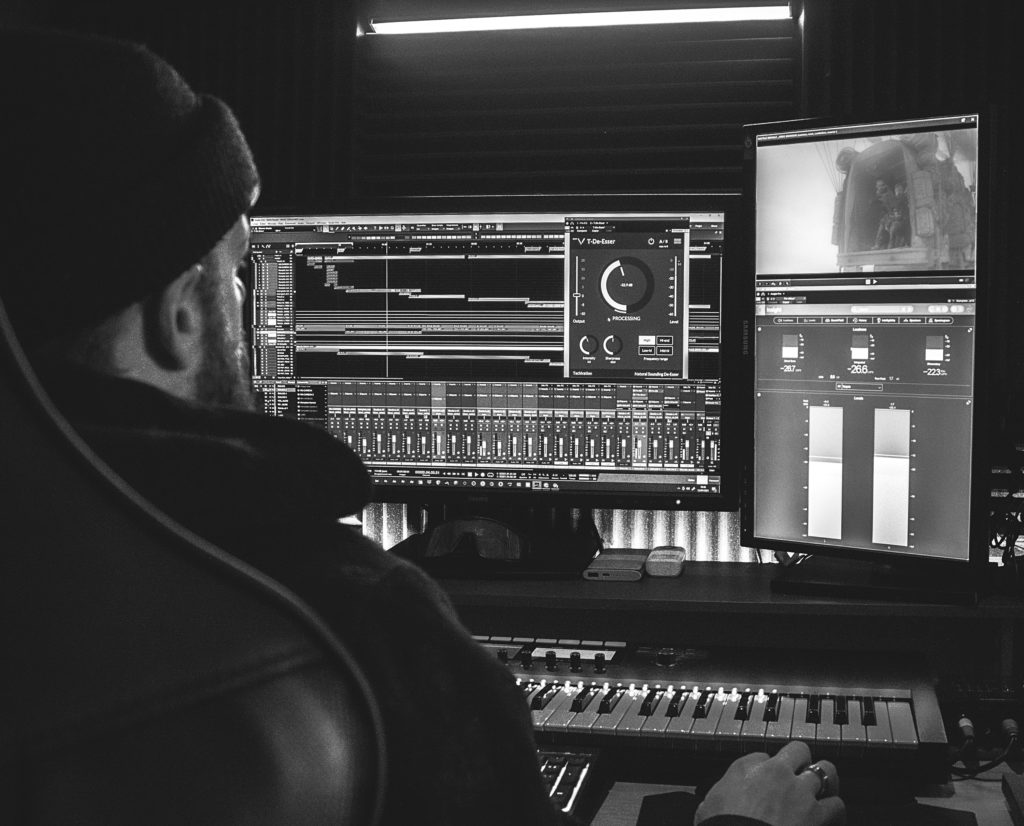
Essential Skills for Music Producers
Becoming a music producer requires a diverse set of skills. While natural talent helps, many essential music production skills can be learned and refined over time. Let’s break down the key abilities and knowledge bases producers need in their toolkit.
Musical Skills
Successful music producers possess a solid grasp of musical concepts and abilities:
Music Theory Knowledge
Having a working knowledge of music theory allows producers to communicate effectively with artists and make informed creative decisions. Important theory fundamentals to learn include:
- Rhythm and meter
- Melody and harmony
- Chord progressions and song structure
- Tempo, pitch and musical modes
- Forms and compositional techniques
Ability to Play Instruments
While producers don’t need to be virtuosic performers, having competency on melody-focused instruments like vocals, guitar and keyboards is extremely helpful. Understanding technique empowers producers to get the best takes from artists.
Composing and Songwriting
Many producers collaborate on songwriting or compose original music themselves. But even those focused just on studio craft need to intimately understand song structure, melody and phrasing. Great producers hear songs as a whole and know how to craft compelling compositions.
Building foundational musical skills takes consistent practice and study. But having command of music’s core elements allows producers to make the most of studio time and sessions.
Technical Skills
Beyond pure musicianship, producers need to be fluent in the tools of the trade:
Recording, Editing and Mixing Skills
Top-notch producers have mastered the technical craft of studio production. Key skills include:
- Operating DAW software to record, edit and mix tracks
- Microphone selection and placement for quality recordings
- Editing and comping takes together into a master performance
- Balancing EQ, compression, effects during mixing
- Automation for dynamic mix moves
- Mastering basics to prep mixes for release
Many producers start out as recording engineers to hone their technical chops before moving into helming full productions.
Equipment and Software Knowledge
Even producers who don’t engineer their own sessions need fluency in studio gear and technology. Understand how to:
- Utilize synths, samplers and MIDI tools for creative sound design
- Get the most out of microphones and preamps for quality recordings
- Effectively incorporate analog outboard gear into sessions
- Troubleshoot technical issues that arise
Learning never stops as new software, plugins, instruments and tools enter the market. Staying current empowers producers to get the sounds they hear in their heads.
Business & Communication Skills
Producing involves more than just studio craft. Strong business acumen and people skills also make producers excel:
Negotiation and Networking
Producers negotiate with artists, labels and collaborators daily. Hone negotiation tactics to secure win-win deals. Networking expands your opportunities and circles. Nurture your network by being reliable and likable.
People Skills and Psychology
Managing big egos and personalities is par for the course. Sharp listening and communication skills help resolve conflicts. Understanding human psychology creates trust with artists. Stay cool under pressure.
Music Industry Expertise
Learn the landscape of labels, publishers, licensing, distribution, royalties and contracts. Understand how backend songwriting splits work. Stay current on tech and trends influencing music.
Business and Management Skills
Handle budgets, schedules and invoices proficiently. Organize workflow and sessions efficiently. Develop marketing plans for releases. Manage income streams and finances responsibly.
Just as important as studio skills, these business and interpersonal abilities enable producers to thrive in the collaborative music industry. Polish these areas to open more doors.
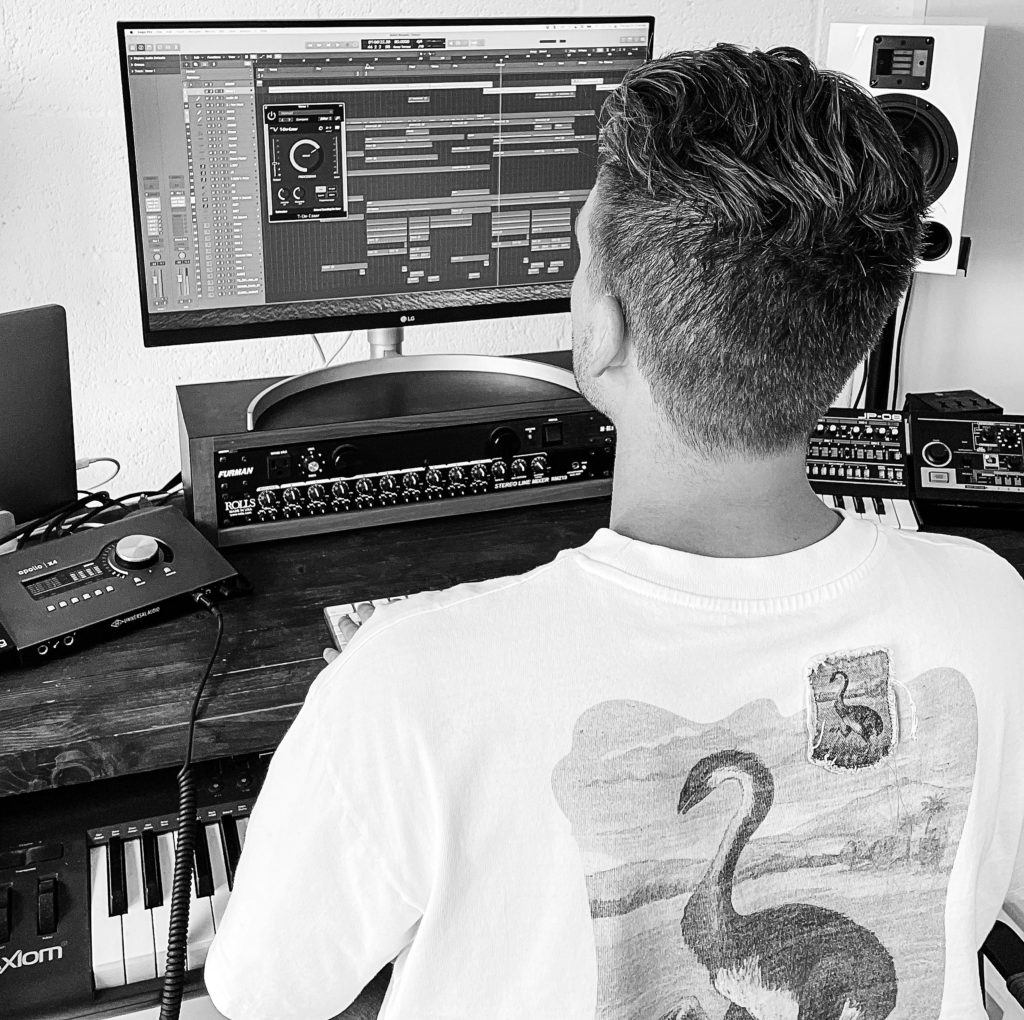
Getting Started as a Producer in Music Industry
With passion and commitment, you can start honing your producing skills from the comfort of your own home. Here are tips for building a foundation as an aspiring bedroom producer:
Home Music Studio Setup
Building a starter home studio doesn’t require expensive gear if you focus on the essentials:
Essential Equipment
- Computer – A sufficiently powerful laptop or desktop to run production software smoothly.
- DAW – Digital Audio Workstation software like Ableton Live, Logic Pro, FL Studio etc.
- Audio Interface – An interface like the Focusrite Scarlett provides inputs for mics and instruments to record into the DAW.
- Studio Headphones – Quality headphones like the Sony MDR-7506 provide accurate sound for mixing.
- Studio Monitors – Monitor speakers like the Yamaha HS5 let you hear your mixes as listeners will.
- MIDI Keyboard – A keyboard like the Akai MPK Mini plays and records virtual instrument parts.
Acoustics and Sound Treatment
Treat acoustic issues in your space:
- Add acoustic foam to flat walls to reduce reflections.
- Don’t produce in an empty tile room – too “live.”
- Record vocals in a closet lined with clothes for a dry vocal “booth.”
Recording and Mixing Basics
Learn fundamental production skills:
- Set proper gain levels when recording.
- Use EQ to shape sounds in a mix.
- Apply light compression to “glue” elements together.
- Add subtle reverb for space and depth.
With core gear and knowledge, you can begin producing from home. Upgrade over time as skills progress.
Learning the Craft
There are many paths to build your production skills:
Formal Education Options
Getting a degree in music production or audio engineering from an accredited program provides extensive training. Top schools like Berklee College of Music, NYU Steinhardt, and USC Thornton School of Music offer bachelor’s and master’s programs in music production, technology, and business. Programs provide access to professional studios and esteemed faculty.
Trade schools like Dubspot, Icon Collective, and Blackbird Academy offer intensive certificates in music production, DJing, and electronic music.
Hands-on Training
Learn by doing through:
- Internships at recording studios to gain real-world experience and connections.
- Assistant engineering under the guidance of professionals.
- Collaborating on projects for up-and-coming artists.
Online Courses and Communities
Today’s abundance of online learning options make production education accessible to all:
- Try production courses on platforms like Coursera, Udemy, and Skillshare.
- Watch tutorials from accomplished producers on YouTube and forums.
- Get feedback by sharing work on communities like Reddit and Discord.
With persistence, you can build formidable skills through any combination of these learning pathways.
Building Your Portfolio
To attract artists to work with you, start amassing an impressive catalog of productions:
Create Original Music
- Produce your own songs and instrumentals to showcase your talents.
- Use these portfolio pieces when pitching to potential clients.
- Release music online to build a fanbase.
Collaborate With Artists
- Reach out to unsigned, rising artists who may exchange credits for affordable rates.
- Cooperate on projects for mutual benefit and growth.
- Gain real artist production experience.
Offer Services Pro Bono
- Volunteer production help to artists for free.
- Build relationships in your local scene.
- Accumulate credits and samples for your portfolio.
By creating diverse productions and collaborations, you establish credibility and prove your skills to earn paying clients.
Music Producer Salaries & Earnings Potential
How much do music producers make? Producer incomes vary widely based on experience level and credits. But the potential to earn life-changing money exists for hitmakers at the top.
Salary Ranges for Producers in Music Industry
According to Payscale, average salaries for music producers in the U.S. fall between:
- $45,000 to $65,000 for entry-level or assistant producers
- $65,000 to $120,000 for mid-level producers with 5-10 years experience
- $100,000 to $200,000+ for veteran producers with decades of credits
The very top A-List producers can earn over $1 million per year. For example, pop producer Max Martin reportedly earns over $19 million annually.
But salaries only tell part of the story. Producers supplement incomes with multiple revenue streams.
Income Streams for Music Producers
Producers earn money from:
- Upfront project fees – Session rates and flat project fees
- Royalties – Ongoing backend royalties from song credits
- Collaborations – Shares of artist project profits
- Sync licensing – Fees for placements in ads, film, TV
- Sample packs – Selling their original sounds
- Teaching – Production workshops and tutorials
With luck and hustle, incomes can snowball as opportunities expand.
Factors Affecting Earnings of Producers
Producers can increase their earning potential by:
- Establishing a reputation on acclaimed work
- Working with major artists on hit projects
- Developing a signature, sought-after sound
- Producing singles that land on the charts
- Securing sync licensing placements
- Networking extensively and hustling for gigs
With persistence and artistry, the hardest working producers can reach the highest echelons of pay and prestige.
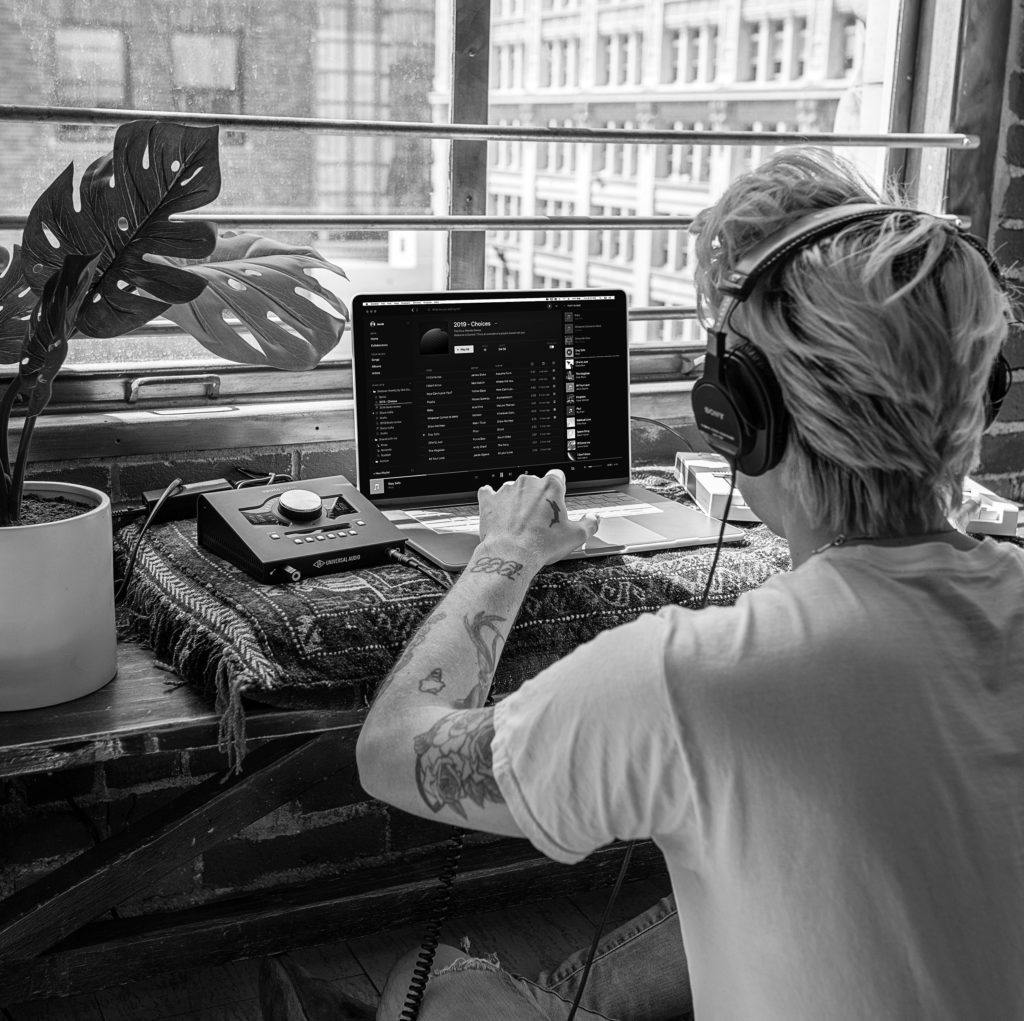
Career Outlook for Music Producers
What is the future outlook for music production careers? Despite industry shifts, the producer role remains indispensable for helping artists fully manifest their visions.
State of the Music Industry
Streaming now dominates music consumption. Though revenues are growing, lower per-stream royalties pose challenges. luckily, dedicated fan bases can help artists thrive.
Production technologies continue advancing rapidly. Bedroom producers compete with major studios. The barriers to professional quality music are disappearing.
Expected Growth
Per the U.S. Bureau of Labor Statistics, jobs for producers and directors are projected to grow 9% from 2020 to 2030, faster than the average occupation.
Music streaming promotes more new releases, requiring more productions. Sync licensing for ads and media also grows demand for new music.
Job Opportunities
Producers are needed both in major hubs like L.A., New York, Nashville as well as secondary metros with vibrant local scenes.
Opportunities span both major label and indie artist projects across all popular genres. Niche scenes like electronic, metal and jazz also seek producers.
Niches and Specializations
Consider tailored niches that leverage your other talents:
- Vocal production for singers/songwriters
- Remixing for EDM producers
- Instrumental hip-hop beats
- Mixing services for clients worldwide
- Film/TV music supervisor
- Trailer music production
Rather than compete broadly, prosper by dominating a niche aligned with your unique skills and interests. The future looks bright for committed producers who adapt.
Networking and Making Connections
They say it’s not what you know, it’s who you know. Networking is critical for producers to find work and advance their careers.
Attend Industry Events and Conferences
Great networking happens face-to-face:
- Go to artist showcases like ASCAP’s Expo or Dew Tour.
- Attend production conferences like the NAMM Show or AES Convention.
- Introduce yourself to people at industry parties and gatherings.
- Leverage music connections from your alma mater.
- Talk shop but also build personal rapport.
Join Professional Associations
Groups like:
- Recording Academy (GRAMMYs)
- Audio Engineering Society
- Music Producers Guild
- Music Business Association
Offer networking, continuing education, job boards and more for members.
Build Your Online Presence
Have a professional website highlighting your credits and skills. Be active on music sites and forums. Promote your work on social media. Follow key industry figures. Utilize LinkedIn. Become a valuable member of online communities.
Persistently expanding your web of connections, both online and offline, is proven to create opportunities. Don’t isolate yourself – network!
Overcoming Challenges as a Music Producer
A producer’s job is not all gold records and Grammys. There are inevitable struggles on the path to success.
Creative Differences and Egos
Clashing with artist expectations is common. Egos and opinions often collide in the studio. Effective tactics include:
- Being an empathetic listener and finding compromise
- Having artists demo their vision to find common ground
- Using diplomacy and emotional intelligence in negotiations
- Gaining artists’ trust in your vision
- Knowing when to flex and when to concede
Work-Life Balance
Producers often work irregular overnight hours in the studio. Set boundaries and take time for your mental health:
- Don’t overbook yourself – leave time to recharge
- Take regular vacations completely away from music
- Don’t isolate yourself in the studio – stay socially active
- Eat healthy and stay active to avoid burnout
Staying Inspired Through Setbacks
Persevering after demoralizing failures is challenging. Regain inspiration by:
- Believing in your vision through ups and downs
- Collaborating with artists who energize you
- Starting passion projects just for creative fulfillment
- Taking a step back to gain fresh perspective
- Recalling your original spark for producing music
Overcoming hurdles ultimately strengthens producers for long-term success.
Impact of Technology on Music Production
From tape to streaming, tech revolutions continue transforming the craft of music production.
Analog to Digital
The shift from analog tape to digital production revolutionized workflows:
- Infinite track counts vs. limited tape tracks
- Non-linear DAW editing vs. tape splicing
- Virtually unlimited takes vs. tape reels running out
- Vast software instrument/effect options
- Collaboration from anywhere via file sharing
Hardware to Software
Virtual instruments and plugins now emulate iconic hardware:
- Classic synth and drum machine emulations
- Algorithmic modeling of analog circuitry
- Powerful mixing and mastering plug-ins
- Lower costs improving accessibility
Yet many still prefer analog sound and hands-on hardware workflow. The best producers blend both worlds.
New Distribution Models
Streaming changed music consumption models:
- Singles and albums always accessible, not constrained by formats
- Shorter listener attention spans influence production aesthetics
- Playlisting curation increasingly impacts success
- Lower per-stream royalties shifts business models
To stay current, producers must understand new technologies shaping how music is created and heard.
Drawing Inspiration from Legendary Producers
The icons of music production have key lessons to impart. Let’s examine case studies of two legends.
Quincy Jones
Hits from Frank Sinatra to Michael Jackson, producer Quincy Jones’ career reveals:
- Adaptability – Stay relevant by embracing new tech, genres, styles
- Curation – Surround yourself with the best artists, musicians, collaborators
- Work Ethic – Persist through failures; always be honing your craft
- Experimentation – Blend genres; take risks to create new sounds
- Openness – Listen to all types of music from the full range of human experience
Rick Rubin
Producer Rick Rubin brought rap, rock and pop artists alike to new heights:
- Simplicity – Strip away rather than add; realize the essence of an artist
- Coaching – Draw out unexpected depths from artists; ask thoughtful questions
- Individualized Approach – Recognize each artist has distinct needs; don’t use one formula
- Sonic Consistency – Create cohesion even across very diverse artists and genres
- Masterful Minimalism – Use restraint; don’t overproduce; let space groove
Dr. Dre
The hip-hop magnate behind N.W.A., Snoop, Eminem, and more teaches:
- Uncompromising perfectionism – Strive for excellence, don’t settle
- Sonic diversity – Expand your sound palette across projects
- Investing in talent – Help develop new artists into superstars
- Maintaining relevance – Continue evolving with the times
Brian Eno
The experimental producer behind Bowie, U2 and Coldplay reveals:
- Creativity from limitations – Innovate by imposing constraints
- Textural richness – Use effects and layers masterfully
- Conceptual boldness – Make bold artistic statements
- Frequent reinvention – Seek new frontiers; avoid complacency
Arif Mardin
The architect of timeless R&B classics shows:
- Serving the song – Let the material guide production choices
- Capturing emotion – Prioritize feel over technical perfectionism
- Cultural synthesis – Fearlessly blend styles from different traditions
- Chemistry curation – Assemble groups with collaborative chemistry
George Martin
The man behind The Beatles’ masterpieces displayed:
- Studio innovation – Embrace new tech to create new sounds
- Arrangement mastery – Transform songs compositionally
- Group psychology – Manage personalities; resolve tensions
- Musical eclecticism – Be open to disparate influences
- Trust in artists – Believe in their vision; be their ally
Develop Your Unique Style
While studying legends’ work, don’t imitate. Find your own sound and style. Authenticity resonates most.
Final Thoughts
The journey to becoming a professional music producer requires intense dedication but offers immense creative fulfillment.
In this guide, we covered the key steps to develop sought-after production skills, amass industry contacts, and prime yourself for success. You explored everything from building a home studio to networking tactics to overcoming common producer challenges.
Ultimately, sustaining a long, prosperous production career takes continuous learning and improvement. Consume all styles of music voraciously. Refine your technical abilities daily. Expand your business savvy. Seek new collaborative opportunities. Challenge yourself to keep innovating artistically. Greatness requires lifelong growth.
Most importantly, persistently nurture the passion that sparked your producing ambitions initially. Stay enthralled with the craft of sculpting music. Bring joy into the lives of listeners. A producer’s work positively impacts the world.
The journey ahead will have peaks and valleys. But by boldly pursuing your producing purpose, you can craft a fulfilling career doing what you love – helping artists fully manifest their creative vision. The time to start is now. Your first masterpiece is waiting to be produced.

